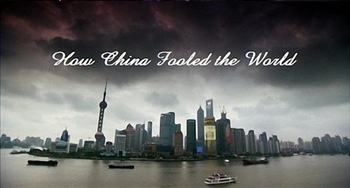Fooling the world or forging a new path?
 0 Comment(s)
0 Comment(s) Print
Print E-mail China Digest, August 15, 2014
E-mail China Digest, August 15, 2014

Editor's note: Did China really "fool the world" with its economic development and steady progression in the years following the Great Recession? A February documentary from the BBC believes so, but do the Chinese? China Digest asks these questions and more.

How China Fooled the World, a documentary screened by the British Broadcasting Corporation (BBC) in February, talks about how China's economy has maintained its growth momentum since the 2008 global financial downturn, attributing China's economic growth to tremendous bank loans used to fund infrastructure investment across the country. According to the documentary, such a strategy has led to an illusion of prosperous economic development while ignoring the overheating real estate market, rampant shadow banking and mounting local government debt. The documentary, using Wuhan, the capital city of central China's Hubei Province, as a backdrop, examines how China's economy has developed so fast since the international financial crisis and concludes that the development mode of the Chinese economy is not sustainable. In this issue, China Digest invites some economists, academics and Chinese netizens to discuss this topic and the documentary.
|
|
|
|
Kuang Xianming is the director of the Research Center for Economy at Hainan's China Institute for Reform and Development. |
The BBC documentary ignored the increasing domestic consumption demand and China's structural reforms, choosing to focus solely on the potential risks of such economic development, then exaggerating the risks. >> |
 |
|
|
Yi Xianrong is an economist at the Chinese Academy of Social Sciences, a government think tank in Beijing |
Rather than be overly concerned with the BBC's fault-finding comments, we need to clearly recognize the potential danger within the Chinese economy at present and be aware of how the government means to address the issue. The documentary provides us with simply another angle by which to observe the Chinese economy. China will not fool the world, but the world won't be fooled by the BBC either. >> |
|
Discussion at "Listening to Surf on East Lake" QQ Community |
Netizen "Ecoman"
What the BBC documentary details is true but incomplete. It doesn't include all the challenges that China's economy faces. It is easy to find problems in China; I could tell you more about China's problems than the documentary did in an hour. However, I don't understand why the film's title uses the word "fooled". Essentially, the documentary tries to reveal whether China's economic growth mode is sustainable or not, but it over-interprets the issue. In my opinion, the documentary uses the title just to attract attention. Few would watch if it used a boring title like "The Challenges of China's Economic Restructuring." Many have discussed this topic in China before. In my opinion, the documentary is objective but shallow in its content.
Netizen "Obama"
The BBC is not wrong in judging China's economic situation according to its own dissertation and way of thinking. The only problem is that it is impossible for its reporters to acquire a deep enough understanding of China's economy within a limited period of time. Badmouthing China in the media is nothing new to us. We don't expect that foreign reporters could generate in-depth analysis and conclusions on China's social phenomena based upon only a dozen or so days of interviewing.
Netizen "Breeze"
What the BBC documentary explains is based on fact. From the perspective of Western economics, China's economic development mode is irrational. The documentary contains no prejudice or agenda. Perhaps the film would not have attracted so much concern if its title was changed to "China's Economy on the Verge of Collapse" or "What China's Unique Development Brings the World". To some extent, the documentary looks like an advertisement for Wuhan's urban construction.
The documentary's title, How China Fooled the World, implies that the Chinese government is a swindler, deliberately fooling the world like Lehman Brothers did by filing for bankruptcy. Western countries worry that a mega-economy like China's falling into crisis would generate worldwide financial catastrophe. In the eyes of Westerners, governments are not to be trusted, especially a Chinese government that seems steeped in mystery and opacity. In their opinion, a government is always trying to fool its people. Therefore, the documentary's title isn't meant to offend China intentionally.
Netizen "1,000-Mile Light"
Although its title is striking, the BBC documentary doesn't tell how China fooled the world, except for the Western world's worry about China's economy arising from something that they do not understand. From another perspective, the documentary also implies the BBC's worry about China's integration into the world economy. The mayor of Wuhan should see the documentary as a warning, so as to avoid economic recession.
Netizen "Not a Single Penny in Hand"
Foreigners must see us clearer than we see ourselves.







Go to Forum >>0 Comment(s)